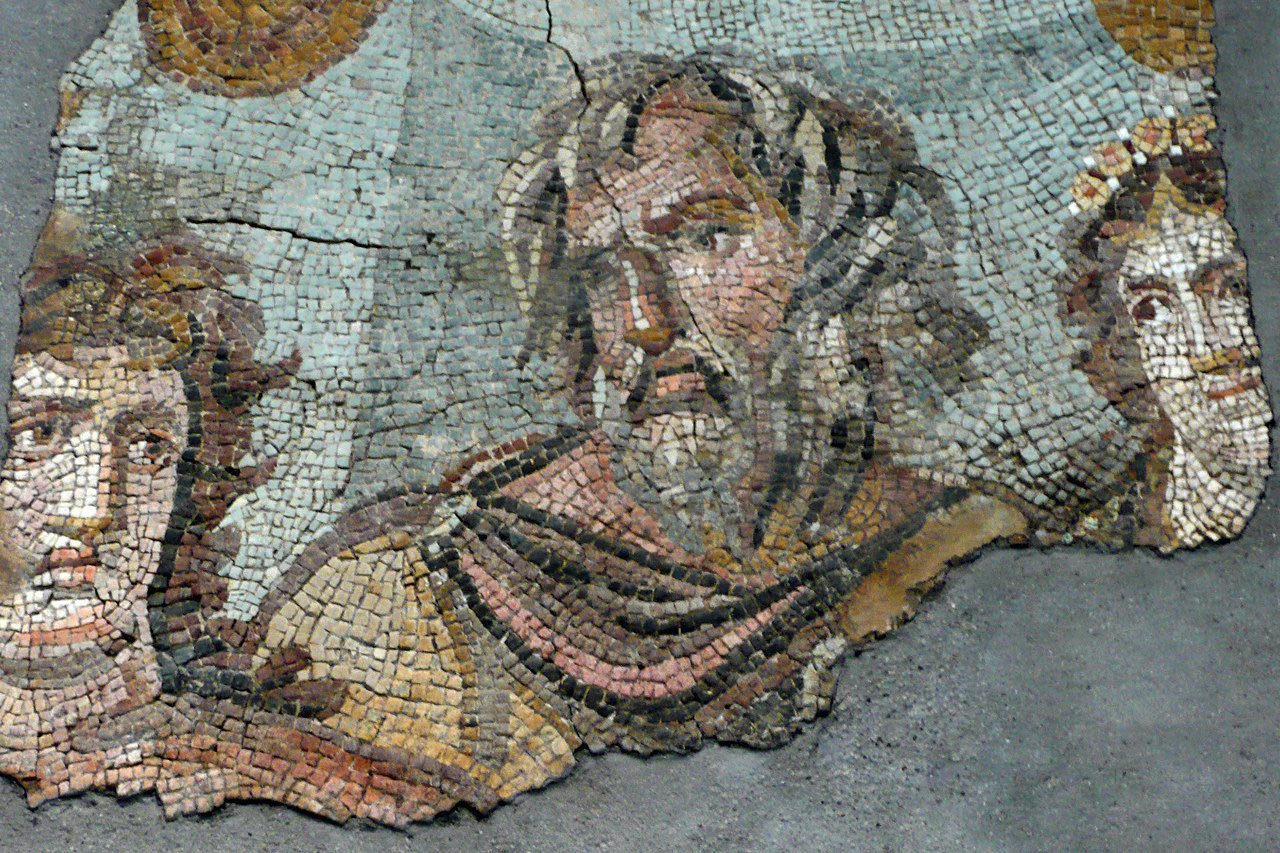A VISIT TO KING NESTOR
“How can I greet him, Mentor, even approach the king? I’m hardly adept at subtle conversation.”
Art: Mosaic with the Removal of Briseis (Illiad, Bk 1, l. 409-415) - Roman (2nd C AD), with Nestor at the center. Getty Villa.
“How can I greet him, Mentor, even approach the king? I’m hardly adept at subtle conversation,” asks Telemachus. But Athena reassures that some words will come from him, and others from divine inspiration. Nestor and his son, Pisistratus, extend hospitality. Pisistratus gives the cup to Mentor first. Only after the custom is observed does Nestor ask questions. That’s when Athena fills Telemachus’s heart with the courage to ask news of his father. Nestor recalls the harrowing memories of the massacre at Troy, where he lost so many comrades at arms, like the great Achilles, Patroclus, Antilochus—and Ajax, lost at sea. (Read more about the battles in Homer’s Iliad.) The suffering was so great, Nestor says he cannot put it into words. He tells of Odysseus’s feats in battle—how he outdid them all in cunning. And he recognizes Telemachus as Odysseus’s son, in no small part because of his “way with words.” No doubt because Athena is now inspiring Telemachus, as she often inspired his father. He tells of how Agamemnon sought to appease Athena’s wrath, but nothing could be done—a wildly dramatic moment since she’s standing right there. Note a key detail Nestor shares about his journey home: he and his men offered up countless sacrifices to Poseidon, the very god whom we know is angry at Odysseus. (And in fact, book 3 opened with yet more sacrifices and feasts in honor of the sea god.) Agamemnon, meanwhile, also made it home but we hear again how he was treacherously murdered by his wife’s lover, Aegisthus, later killed by Orestes, her son with Agamemnon. We heard that detail, too, in Book 1. Why do you think Homer repeats it again for us here? What effect does this repetition produce? It’s interesting because this time, we hear Telemachus declare that he wishes he might be as famous as Orestes, for having the courage and divine strength to slaughter all the suitors—remember that. This prompts Nestor to wish for Telemachus that a great god, like Pallas Athena, who so favored his father, might bestow favor upon him. When I read this passage, I always wonder: does Nestor suspect Mentor is in disguise? If so, what dramatic subtext. What’s more, it occurs right at the midpoint of Book 3. Seems strategic. Notice how Athena rebukes Telemachus for his lack of hope and faith in her here. She reminds him that no god can intervene when Fate / the Fates hold sway. Death is “the great leveler” that comes for us all—a lesson Gilgamesh had to learn, too. But Telemachus is convinced that there’s no hope, now, of Odysseus’s return. Instead he wants to hear all the details of how Agammemnon met his death. If there’s a lesson in Agammenon’s story, Nestor warns Telemachus that it’s not to stay away from home too long, and to get back, before the suitors wreak even more havoc. Notice Athena’s patience. Still, she doesn’t reveal herself. In fact, she commends Nestor on a tale well-told. Let’s not forget that in addition to being the goddess of War and Wisdom, Athena is also the goddess of weaving. Wait, might it be her who inspired Penelope to weave the funeral shroud? Weaving is also closely related to the weaving of stories, so the complement, coming from Athena herself, is notable. It’s at this moment that Athena (as Mentor) announces that she’ll go down to the ship and watch over it and the men as Telemachus sleeps. Then, she strategically reveals herself and flies off, to the amazement of all. Without skipping a beat, Nestor honors her and tells Telemachus not to fear for courage: Athena is with him. And devoutly, he prays to the goddess. The next morning, Nestor arranges a sacrifice to Athena and sends his son and fresh horses to lead Telemachus on to Sparta. No wonder Athena brought him to Nestor: he exemplifies what it means to act piously (as Aeneas will) towards the god.
-
Read the Odyssey online in the translation by Robert Fagles, or order the paperback.
Learn more about the longstanding controversies and theories about who Homer may, and may not, have been.
